| Listing 1 - 10 of 35 | << page >> |
Sort by
|
Book
ISBN: 3170139282 9783170139282 Year: 1995 Volume: 9 Publisher: Stuttgart Kohlhammer
Abstract | Keywords | Export | Availability | Bookmark
 Loading...
Loading...Choose an application
- Reference Manager
- EndNote
- RefWorks (Direct export to RefWorks)
Church and state --- National socialism and religion. --- 27 <43> "1933/1945" --- -National socialism and religion --- Religion and national socialism --- Religion --- Christianity and state --- Separation of church and state --- State and church --- State, The --- Kerkgeschiedenis--Duitsland voor 1945 en na 1989--?"1933/1945" --- National socialism and religion --- Church and state - Europe.
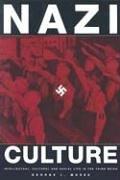
ISBN: 0299193047 9780299193041 Year: 2003 Publisher: Madison, WI : University of Wisconsin Press,
Abstract | Keywords | Export | Availability | Bookmark
 Loading...
Loading...Choose an application
- Reference Manager
- EndNote
- RefWorks (Direct export to RefWorks)
National socialism and art --- National socialism and intellectuals --- National socialism and religion --- Religion and national socialism --- Religion --- Intellectuals and national socialism --- Intellectuals --- Art and national socialism --- Nazi art --- Art --- Germany --- Intellectual life --- Social life and customs --- NATIONAL-SOCIALISME ET ART --- NAZISME --- ALLEMAGNE --- ASPECTS CULTURELS --- CIVILISATION --- 1933-1945 --- VIE INTELLECTUELLE
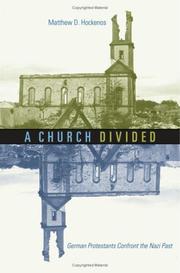
ISBN: 0253110319 9780253110312 9780253344489 0253344484 Year: 2004 Publisher: Bloomington : Indiana University Press,
Abstract | Keywords | Export | Availability | Bookmark
 Loading...
Loading...Choose an application
- Reference Manager
- EndNote
- RefWorks (Direct export to RefWorks)
This book closely examines the turmoil in the German Protestant churches in the immediate postwar years as they attempted to come to terms with the recent past. Reeling from the impact of war, the churches addressed the consequences of cooperation with the regime and the treatment of Jews. In Germany, the Protestant Church consisted of 28 autonomous regional churches. During the Nazi years, these churches formed into various alliances. One group, the German Christian Church, openly aligned itself with
Church and state --- National socialism and religion. --- Guilt --- Protestant churches --- Church history --- Religion and national socialism --- Religion --- Emotions --- Ethics --- Conscience --- Shame --- History --- Religious aspects --- Christianity --- History of doctrines --- Psychological aspects --- Germany --- National socialism and religion --- 284.1 <43> "1933/1945" --- 284.1 <43> "1933/1945" Bekennende Kirche. Barmen Erklärung --- 284.1 <43> "1933/1945" Reichskirche --- Bekennende Kirche. Barmen Erklärung --- Reichskirche
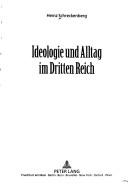
ISBN: 3631513259 Year: 2003 Publisher: Frankfurt am Main Lang
Abstract | Keywords | Export | Availability | Bookmark
 Loading...
Loading...Choose an application
- Reference Manager
- EndNote
- RefWorks (Direct export to RefWorks)
History of Germany and Austria --- anno 1940-1949 --- anno 1910-1919 --- anno 1930-1939 --- anno 1920-1929 --- National socialism. --- Ideology --- National socialism and religion. --- Racism --- Nazisme --- Idéologie --- Racisme --- History --- Aspect religieux --- Histoire --- Germany --- Allemagne --- #PBIB:2004.2 --- Idéologie --- National socialism --- National socialism and religion --- Religion and national socialism --- Nazism --- Third Reich, 1933-1945 --- Religion --- Authoritarianism --- Fascism --- Nazis --- Neo-Nazism --- Totalitarianism --- World War, 1939-1945 --- Knowledge, Theory of --- Philosophy --- Political science --- Psychology --- Thought and thinking --- Causes
Book
ISBN: 3506799975 9783506799975 Year: 2003 Volume: 92 Publisher: Paderborn Schöningh
Abstract | Keywords | Export | Availability | Bookmark
 Loading...
Loading...Choose an application
- Reference Manager
- EndNote
- RefWorks (Direct export to RefWorks)
Church and state --- National socialism and religion. --- History --- Sicherheitsdienst der SS [Deutschland] --- Kerkgeschiedenis--Duitsland voor 1945 en na 1989--?"1933/1945" --- Political philosophy. Social philosophy --- History of Germany and Austria --- anno 1940-1949 --- anno 1930-1939 --- National socialism and religion --- 27 <43> "1933/1945" --- Religion and national socialism --- Nationalsozialistische Deutsche Arbeiter-Partei. --- Germany. --- SD --- Sicherheitsdienst der SS --- Germany --- Church history --- Religion --- Church and state - Germany - History - 1933-1945.
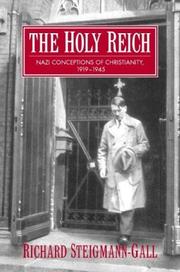
ISBN: 9780521823715 9780511818103 9780521603522 0521603528 0521823714 9781461938309 1461938309 0511818106 1139883070 1107385822 1107383927 1107390354 1107398762 1107387434 Year: 2003 Publisher: Cambridge : Cambridge University Press,
Abstract | Keywords | Export | Availability | Bookmark
 Loading...
Loading...Choose an application
- Reference Manager
- EndNote
- RefWorks (Direct export to RefWorks)
Analyzing the previously unexplored religious views of the Nazi elite, Richard Steigmann-Gall argues against the consensus that Nazism as a whole was either unrelated to Christianity or actively opposed to it. He demonstrates that many participants in the Nazi movement believed that the contours of their ideology were based on a Christian understanding of Germany's ills and their cure. A program usually regarded as secular in inspiration - the creation of a racialist 'people's community' embracing antisemitism, antiliberalism and anti-Marxism - was, for these Nazis, conceived in explicitly Christian terms. His examination centers on the concept of 'positive Christianity,' a religion espoused by many members of the party leadership. He also explores the struggle the 'positive Christians' waged with the party's paganists - those who rejected Christianity in toto as foreign and corrupting - and demonstrates that this was not just a conflict over religion, but over the very meaning of Nazi ideology itself.
German-Christian movement --- Chrétiens allemands (Mouvement) --- Chrétiens allemands (Mouvement) --- Christendom en antisemitisme --- Allemagne --- Histoire --- National socialism and religion. --- Christianity and antisemitism. --- Church and state --- Nazisme --- Christianisme et antisémitisme --- Eglise et Etat --- History --- History. --- Aspect religieux --- Germany --- Church history --- Politics and government --- Histoire religieuse --- Politique et gouvernement --- National socialism and religion --- Christianity and antisemitism --- 1933-1945 --- 20th century --- Antisemitism and Christianity --- Christianity and other religions --- Religion and national socialism --- Religion --- Judaism --- Third Reich, 1933-1945 --- Arts and Humanities --- Allemagne - Histoire - 1933-1945
Book
ISBN: 1441155759 1472543254 1280577010 9786613606723 1441198733 9781441198730 9781441155757 9781441125453 9781472543257 9781280577017 6613606723 Year: 2012 Publisher: London New York Continuum International Pub.
Abstract | Keywords | Export | Availability | Bookmark
 Loading...
Loading...Choose an application
- Reference Manager
- EndNote
- RefWorks (Direct export to RefWorks)
"The Modernist God State seeks to overturn the traditional secularization approach to intellectual and political history and to replace it with a fuller understanding of the religious basis of modernist political movements. Lackey demonstrates that Christianity, instead of fading after the Enlightenment, actually increased its power by becoming embedded within the concept of what was considered the legitimate nation state, thus determining the political agendas of prominent political leaders from King Leopold II to Hitler. Lackey first argues that novelists can represent intellectual and political history in a way that no other intellectual can. Specifically, they can picture a subconscious ideology, which often conflicts with consciously held systems of belief, short-circuiting straight into political action, an idea articulated by E.M. Forster. Second, in contrast to many literary scholars who discuss Hitler and the Nazis without studying and quoting their texts, Lackey draws his conclusions from close readings of their writings. In doing so, he shows that one cannot understand the Nazis without taking into account the specific version of Christianity underwriting their political agenda."--Bloomsbury Publishing.
Secularization (Theology) --- Modernism (Christian theology) --- Secular theology --- Death of God theology --- Secularism --- Theology, Doctrinal --- Modernism --- Modernist-fundamentalist controversy --- History --- Christianity and literature --- Church and state --- Fiction --- Literature --- National socialism and religion. --- Nation-state --- Politics and literature --- History and criticism. --- Aesthetics. --- Literature and politics --- National state --- State, The --- National interest --- Self-determination, National --- Religion and national socialism --- Religion --- Aesthetics --- Church history --- Literature and Christianity --- Christian literature --- Political aspects
Book
ISBN: 3506734431 9783506734433 Year: 2006 Publisher: Paderborn [etc.] Ferdinand Schöningh
Abstract | Keywords | Export | Availability | Bookmark
 Loading...
Loading...Choose an application
- Reference Manager
- EndNote
- RefWorks (Direct export to RefWorks)
27 <43> "1933/1945" --- Kerkgeschiedenis--Duitsland voor 1945 en na 1989--?"1933/1945" --- National socialism and religion --- Religion and national socialism --- Religion --- Catholic Church --- History --- Church of Rome --- Roman Catholic Church --- Katholische Kirche --- Katolyt︠s︡ʹka t︠s︡erkva --- Römisch-Katholische Kirche --- Römische Kirche --- Ecclesia Catholica --- Eglise catholique --- Eglise catholique-romaine --- Katolicheskai︠a︡ t︠s︡erkovʹ --- Chiesa cattolica --- Iglesia Católica --- Kościół Katolicki --- Katolicki Kościół --- Kościół Rzymskokatolicki --- Nihon Katorikku Kyōkai --- Katholikē Ekklēsia --- Gereja Katolik --- Kenesiyah ha-Ḳatolit --- Kanisa Katoliki --- כנסיה הקתולית --- כנסייה הקתולית --- 가톨릭교 --- 천주교
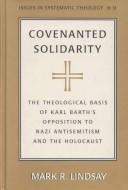
ISBN: 0820451916 9780820451916 Year: 2001 Volume: 9 Publisher: New York Lang
Abstract | Keywords | Export | Availability | Bookmark
 Loading...
Loading...Choose an application
- Reference Manager
- EndNote
- RefWorks (Direct export to RefWorks)
Judaism (Christian theology) --- Christianity and antisemitism --- National socialism and religion. --- Holocaust (Christian theology) --- History of doctrines --- History --- 20th century. --- -Christianity and antisemitism --- -National socialism and religion --- Holocaust, Jewish (1939-1945) --- Religion and national socialism --- Religion --- Antisemitism and Christianity --- Christianity and other religions --- -History --- -20th century --- Judaism --- Barth, Karl --- -بارث، كارل --- カール・バルト --- Contributions in Christian theology of Judaism --- -Contributions in Christian theology of Judaism --- National socialism and religion --- History&delete& --- 20th century --- Barth, Karl, --- Parŭtʻŭ, Kʻal, --- Barth, Karol, --- Barŭtʻŭ, Kʻal, --- Barŭtʻŭ, --- Bate, --- בארת, קרל, --- カール·バルト, --- 巴特, --- Judaism (Christian theology) - History of doctrines - 20th century. --- Christianity and antisemitism - Germany - History - 20th century.
Book
ISBN: 110701591X 1107663334 9781107015913 9781107663336 9781139224789 1139224786 9781139059602 1139059602 1107230314 1139210084 1280879076 1139223062 9786613720382 1139218263 1139215175 1139221353 9781107230316 9781139210089 9781280879074 9781139223065 6613720380 9781139218269 9781139215176 9781139221351 Year: 2012 Publisher: Cambridge : Cambridge University Press,
Abstract | Keywords | Export | Availability | Bookmark
 Loading...
Loading...Choose an application
- Reference Manager
- EndNote
- RefWorks (Direct export to RefWorks)
In one of the darker aspects of Nazi Germany, churches and universities - generally respected institutions - grew to accept and support Nazi ideology. Robert P. Ericksen explains how an advanced, highly educated, Christian nation could commit the crimes of the Holocaust. This book describes how Germany's intellectual and spiritual leaders enthusiastically partnered with Hitler's regime, thus becoming active participants in the persecution of Jews, and ultimately, in the Holocaust. Ericksen also examines Germany's deeply flawed yet successful postwar policy of denazification in these institutions. Complicity in the Holocaust argues that enthusiasm for Hitler within churches and universities effectively gave Germans permission to participate in the Nazi regime.
Anti-Nazi movement --- Church and state --- Higher education and state --- Holocaust, Jewish (1939-1945) --- National socialism and education --- National socialism and religion --- Universities and colleges --- 27 <43> "1933/1945" --- Church history --- German resistance movement --- World War, 1939-1945 --- Colleges --- Degree-granting institutions --- Higher education institutions --- Higher education providers --- Institutions of higher education --- Postsecondary institutions --- Public institutions --- Schools --- Education, Higher --- Religion and national socialism --- Religion --- Education and national socialism --- Nazi education --- Education --- State and higher education --- Education and state --- History --- Kerkgeschiedenis--Duitsland voor 1945 en na 1989--?"1933/1945" --- Underground movements --- Government policy --- National socialism and education. --- National socialism and religion. --- Arts and Humanities
| Listing 1 - 10 of 35 | << page >> |
Sort by
|

 Search
Search Feedback
Feedback About
About Help
Help News
News